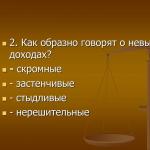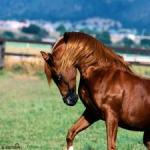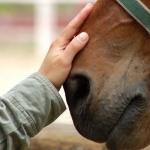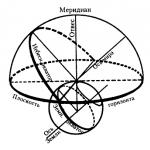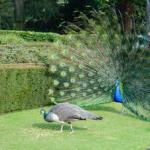Types of power. The supreme power The supreme power is the highest power in the state, which is the source of authority for all its bodies.
It is the highest authority in the state. The supreme power in the state in various proportions is represented by the head of state, the legislature, as well as the government - the central link of the executive, administrative bodies (in the presence of a third power - the judiciary, justice bodies, as well as municipal self-government).
When characterizing the form of the state, an answer should be obtained to the question of who and how "rules" in the state, i.e. exercises supreme power. Hence the name "form of government" (and not
"management", referring only to the executive level of power). The main forms of government are monarchy and republic.
Part one. State
Monarchy is a form of government in accordance with which the supreme power in the state combines the functions of the head of state and, in many respects, the functions of other authorities - legislative and executive, and which belongs to one person - the monarch, a representative of the ruling dynasty, who usually acquires power by inheritance. There are two types of monarchies:
absolute, imperial, autocratic type, in which the monarch
in its supreme power it is not limited by law, it exercises sole power of legislation, directs the government, controls justice, local self-government (such are some of the monarchies of the Middle East at present, for example, Saudi Arabia). This kind of monarchy is characteristic of an authoritarian political regime;
constitutional type, in which the power of the monarch is limited by
konom, first of all the basic law - the constitution, focuses on the functions of the head of state; legislation is carried out by an elected body - parliament; under the certain control of the head of state and parliament, and in some cases even one parliament, a responsible government is created; an independent judiciary and municipal self-government are formed (this is a number of countries
"old" democracy in Europe, for example Great Britain, Sweden). Constitutional monarchies are characterized by a democratic political regime.
A republic is a form of government in which the supreme
power in the state belongs to elected bodies - parliament, president; they form and exercise control over the government; there is an independent judiciary, municipal self-government.
Republics also have two main varieties. This is a parliamentary republic and a presidential republic, distinguished depending on which of the highest authorities - the president or parliament - forms the government and exercises direct leadership of it and, therefore, to whom - the president or parliament - the government is directly responsible.
Parliamentary - such a republic, the parliament of which directly, pre-
It forms a government (one-party, coalition) from its composition of factions, and it is responsible to the Parliament for its activities.
Presidential - such a republic, the president of which is directly
under certain parliamentary control, forms the government
State and law
government, and it is responsible to the president for its activities.
There are mixed forms of republican government - par-
parliamentary-presidential or presidential-parliamentary, when the parliament and the president in one proportion or another share their control and their responsibility in relation to the government. For example, candidates for the government are selected by the president and appointed by the parliament, or the parliament only agrees to the appointment of members of the government or only its head (an option that is closer to a presidential republic). In addition, in recent times there has been a tendency in public life to give greater independence and "own" responsibility to the government, the head of which (like, for example, the chancellor in Germany) occupies an independent high position among the highest officials of the country. Both varieties of the republic, as well as the constitutional monarchy
khiya are associated with the institution of parliamentarism, i.e. such an organization
power in the country, in which the parliament always remains one of the highest authorities, its exclusive right in all cases are legislation and parliamentary control. The principle of parliamentarism must be distinguished from the principle of the omnipotence of a representative body, which (as was typical for the Jacobin dictatorship and as a screen for the dictatorship of the partocracy - for the Soviet state) is characteristic of an authoritarian political regime, a totalitarian state.
The state as a form of organization of political power in society. Power and control.
The term "state" is used in two senses: firstly, to single out the country as a political and geographical entity and, secondly, to refer to the organization of political power, the system of institutions of power. The state in the first sense is studied by different sciences: sociology, political (sociological) geography, etc. The subject of study of the science of jurisprudence is the state in the second (political and legal) sense. Therefore, in this book we will talk about the state as an organization of political power that exists in a particular country.
The forms of exercising state power are the practical expression of state activity in the exercise of the functions of the state.
There are legal and non-legal forms of implementation of the functions of the state. The legal forms reflect the relationship between the state and law, the obligation of the state to act in the performance of its functions on the basis of law and within the framework of the law. In addition, they show how state bodies and officials work, what legal actions they perform. Usually, there are three legal forms for the implementation of the functions of the state - law-making, law enforcement and law enforcement.
Law-making activity is the preparation and publication of normative legal acts, without which the implementation of other functions of the state is practically impossible. For example, how to carry out a social function without codified social legislation, social law?
Whether laws and other normative acts will be implemented or whether they will remain only the good wishes of the legislator depends on the law enforcement activity. The main burden for the implementation of legal norms lies with the governing bodies (executive and administrative bodies), headed by the government of the country. This is a daily work to resolve various issues of a managerial nature, for the implementation of which the executive and administrative bodies issue relevant acts, control the performance of duties by executors, etc.
Law enforcement activities, i.e., imperious operational and law enforcement activities for the protection of law and order, the rights and freedoms of citizens, etc., include the adoption of measures to prevent offenses, the resolution of legal cases, bringing to legal responsibility, etc.
The main features of the state. Supreme power and the mechanism of state power.
The state is a complex social entity that is not amenable to direct empirical perception, since the category of the state has a high level of abstractness. The concept of the state can be given by pointing to its essential features.
1. Territory. This is the spatial basis of the state, its physical, material, support. It includes land, subsoil, water and air space, the continental shelf, etc. The territory is the space of the state, occupied by its population, where the power of the political elite is in full operation. On its territory, the state maintains its sovereign power and has the right to protect it from external intrusion from other states and individuals.
2. Population. This is a human community living on the territory of the state. Population and people (nation) are not identical concepts. A people (nation) is a social group whose members have a sense of community and belonging to the state due to the common features of culture and historical consciousness.
3. Public authority. The term "power" means the ability to influence in the right direction, to subordinate one's will, to impose it on those subject, to exercise domination over them. The mechanism of the state, which is the material expression of state power, makes it possible to ensure the normal functioning of society. Legislative and executive bodies belong to the most important parts of it. Due to its institutionalization, the state enjoys relative stability.
The distinguishing features of state power, in contrast to other types of power (political, party, religious, economic, industrial, family, etc.) are, firstly, its universality, or publicity, i.e., the extension of prerogatives to the entire territory, on the entire population, and also that it represents the whole of society as a whole; secondly, its universality, i.e., the ability to resolve any issues affecting common interests, and, thirdly, the general binding nature of its instructions.
4. Right. As a system of binding rules of conduct, law is a powerful tool of government and begins to be used with the advent of statehood. The state carries out law-making, that is, it issues laws and other normative acts addressed to the entire population. Law allows the authorities to make their orders indisputable, obligatory for the population of the whole country, in order to direct the behavior of the masses in a certain direction.
5. Law enforcement agencies. This part of the state apparatus is quite branched and forms its own subsystem, which includes the judiciary, the prosecutor's office, the police, security agencies, foreign intelligence, tax police, customs authorities, etc.
In addition to applying sanctions for violation of legal norms (collection of customs duties, imposition of punishment, collection of taxes, cancellation of an illegal act, etc.), law enforcement agencies are also used to prevent imbalances in society (registration of a transaction with a notary, reconciliation by a court of disputing parties, warning by police officers offenses, etc.).
6. Army. One of the main goals of the ruling elite is to preserve the territorial integrity of the state. It is well known that border disputes between adjacent states are often the cause of military conflicts. Equipping the army with modern weapons makes it possible to seize the territory of not only neighboring states. For this reason, the armed forces of the country are now a necessary attribute of any state. But they are used not only to protect territorial integrity. The army can also be used in critical internal conflicts, to maintain law and order and the ruling regime, although this is not its direct task.
7. Taxes. They are obligatory and gratuitous payments collected in the established amounts and within a certain period of time, necessary for the maintenance of government bodies, law enforcement agencies, bodies to support the social sphere (education, science, culture, healthcare, etc.), creating reserves in case of emergency accidents, disasters, as well as for the implementation of other general interests. Basically, taxes are levied forcibly, but in countries with developed forms of statehood, they are gradually moving towards their voluntary payment.
8. State sovereignty. As a sign of the state, state sovereignty means that the power that exists in the state acts as the highest power, and in the world community - as independent and independent. In other words, state power legally stands above the power of any other institutions, parties located on the territory of this state.
Distinguish between internal and external sovereignty. Internal sovereignty is the supremacy in the solution of internal affairs. External sovereignty is independence in external affairs. Internal sovereignty is constantly under pressure from national and international groups and other forces representing civil society.
The mechanism of the state is an integral hierarchical system of state bodies and institutions that in practice exercise state power, tasks and functions of the state. The mechanism of the state is an integral part of the essence of the state: outside and without the state mechanism there is no and cannot be a state
Special composition - state bodies and institutions that are part of the structure of the mechanism of the state consist of specially trained people
Special goals of activity - the actual implementation of state power, tasks and functions of the state;
The state apparatus is understood as a system of bodies that directly carry out managerial activities and are endowed with authority for this, and the concept of “mechanism of the state” includes, along with the state apparatus, also state institutions and organizations, as well as “material appendages” of the state apparatus (armed forces, police , penitentiary institutions, etc.), relying on which the state apparatus operates.
The mechanism of the state is a broader category, which includes the entire set of not only employees, but also material and technical objects that serve to implement state functions and tasks. Unlike the mechanism of the state, the apparatus of the state is understood only as a set of civil servants. Thus, the state apparatus is not synonymous with the mechanism of the state, since the mechanism of the state, in addition to state bodies, also includes state institutions and enterprises.
3. Basic concepts of the origin and essence of the state.
1. Theological (divine) theory of the origin of the state and law - the earliest theory that arose from the initial religious and mythological ideas about the origin of the world. Since God created the world, both the state and law are of divine origin. The most famous representative of this doctrine is the theologian Thomas Aquinas (1225-1274).
2. The patriarchal theory of the state, put forward by Aristotle, sees in the state an overgrown family, which also takes care of its subjects, like a father takes care of his children. State power, in accordance with the patriarchal theory, is, as it were, the successor of paternal power, i.e. the power of the monarch, the sovereign for the people is like the power of the father in the family.
3. The contractual theory, or the theory of the contractual origin of the state and law, which arose in Ancient Greece (the sophists, Epicurus, Hippias - V-IV centuries BC), was revived and rethought during the crisis of feudalism in the interests of the emerging at that time bourgeois class. Its representatives (J. Lilburn, T. Hobbes, J. Locke, J.-J. Rousseau, C. Montesquieu, A.N. Radishchev and others) considered the state and law as a product of human reason, and not divine will. People, leaving the "natural" (pre-state) state, united in the state on certain conditions, stipulated in the social contract concluded by them voluntarily and by mutual agreement. The most important of these conditions were recognized as the protection by the state of private property and the security of the individuals who entered into the contract. If the rulers violate the agreement concluded between them and the citizens, they can be deprived of power.
4. Organic theory presents the state as a kind of human organism. The ancient Greek thinker Plato, for example, compared the structure and functions of the state with the ability and aspects of the human soul. Aristotle believed that the state in many respects resembles a living human organism, and on this basis denied the possibility of human existence outside the state. Just as hands and feet taken away from the human body cannot function independently, so a person cannot exist without a state. The largest representative of this theory, G. Spencer, argued that the state is a social organism, consisting of individuals, just as a living organism consists of cells. If the body is healthy, then its cells function normally. If the cells are sick, they reduce the efficiency of the functioning of the whole organism, i.e. states. The state and law are the product of organic evolution. As in nature the fittest survive, so in society, in the process of wars and conquests, a natural selection of the fittest states occurs, functioning in accordance with the law of organic evolution.
5. Theory of violence. The most characteristic features of the theory of violence are outlined in the works of E. Dühring, L. Gumplovich, K. Kautsky and others. In accordance with this theory, the state is the result of violence, hostility, the conquest of some tribes by others, violence becomes the fundamental basis of the state and law. The defeated tribe turns into slaves, and the winner - into the ruling class, private property appears, the winners create a coercive apparatus to control the vanquished, which turns into a state. History knows the real facts of the existence of states as a result of the conquest of some peoples by others (for example, the Golden Horde). But the role of violence in history cannot be absolute, since many states and legal systems were created in the past and are being created now not as a result of external conquest or only by force.
6. Psychological theory reduces the main causes of the emergence of the state and law to certain properties of the human psyche, to biopsychic instincts, etc. The essence of this theory is the approval of the psychological superior Aryan race to destroy entire peoples and national minorities.
7. The materialist (Marxist) theory proceeds from the fact that the state arose primarily due to economic reasons: the social division of labor, the emergence of private property, and then the split of society into classes with opposing economic interests. The tribal organization is being replaced by the state, and tribal customs are being replaced by law. As an objective result of these processes, a state arises, which, by means of special means of suppression and organs constantly engaged in management, restrains the confrontation between classes, ensuring primarily the interests of the economically dominant class. Since the state arose as a result of the division of society into classes, it was concluded that the state is a historically coming, temporary phenomenon - it arose along with the emergence of classes, and so on. must inevitably die out with the disappearance of classes.
State power is a means of governing society, which is based on the authority of force. It is public and political. The public power of the state has the ability to manage the entire society as a whole, and being at the same time political, it implements the will of the political forces that are in power.
In other words, state power is the ability of the state to subjugate the constituent elements of society, taking as a basis the methods of state coercion.
State power is considered developed if its formation and implementation is of a legal nature, if it recognizes and ensures the rights and freedoms of a person that are formed by society, if state power is included in the culture system of the right of society.
State power is, first of all, universality. That is, in this case, state power should extend to all strata of society. The concept of a developed state of state power is used as a criterion for assessing its other states, if the level of development of legal culture and legal consciousness of the subjects of power is taken into account.
In addition, state power is publicity, sovereignty, legitimacy, legality.
The modern understanding of state power distinguishes its primary and secondary subjects. Under the primary subjects is meant on which the legitimacy of state power is based. Only it is endowed with the right to establish or change state power. Assignment of these rights by any other subject from a legal point of view is a crime and is regarded as arbitrariness.
The secondary subject of state power is any power. It can be the head of state, the national assembly, the government. These bodies of state power cannot be created without the direct participation of the primary subjects of state power, that is, the people. The bodies of state power are also ministries, committees, departments, through which specific powers are exercised, realizing the subject of state power performs its special function, which is an important condition that ensures the systemic nature of power.
Thus, the primary subjects exercise the constituent power, and the secondary subjects - the executive, legislative, control and judicial state power.
The totality of bodies that are loosely called the system of state power.
Let's look at the varieties. Firstly, it is the constituent power, which adopts and, of course, amends the constitution of the state, establishes a new power, makes a decision to change the current power to a qualitatively new one.
Thus, the people are endowed with all these functions and the rights to exercise them. Constituent power belongs to the people.
As mentioned above, the remaining elements that are part of the system of state power are the power of the head of state, the executive, or as it is also called, the government of which is the parliament of the country, the judicial and control authorities. All of these bodies are established, but the power they exercise is, to some extent, independent.
Each body of state power is a rather complex organization that has a branched structure.
The above information is a brief answer to the question of what state power is, what are its varieties and varieties.
It is the source of authority for all its organs.
The supreme power has the following main features arising from its fundamental content and state significance:
The bearer of supreme power is called sovereign. Depending on its nature, three historical types of supreme power are distinguished (for the first time, Aristotle):
- monarchical- Supreme power is concentrated in the hands of one person.
- aristocratic nobility.
- Democratic- sovereignty belongs people.
All existing and existing forms of states can be assigned to one of the listed types. At present, most countries have established democratic sovereignty (including countries with constitutional monarchy).
Write a review on the article "Supreme Power"
Notes
Links
- Boden J. Six books about the state.
- Rousseau Zh. Zh. On the Social Contract, or the Principles of Political Law.
- Chicherin B. N. The course of state science.
- Tikhomirov L.A.
see also
An excerpt characterizing the Supreme power
It was impossible to fight when information had not yet been collected, the wounded had not been removed, the shells had not been replenished, the dead had not been counted, new commanders had not been appointed to the places of the dead, people had not eaten and had not slept.But at the same time, immediately after the battle, on the next morning, the French army (according to that impetuous force of movement, now increased, as it were, in the inverse ratio of the squares of distances) was already advancing of itself on the Russian army. Kutuzov wanted to attack the next day, and the whole army wanted it. But in order to attack, the desire to do so is not enough; It is necessary that there was an opportunity to do this, but there was no such opportunity. It was impossible not to retreat one march, then just as it was impossible not to retreat to another and a third march, and finally on September 1, when the army approached Moscow, despite all the strength of the rising feeling in the ranks of the troops, the force of things demanded in order for these troops to go beyond Moscow. And the troops retreated one more, to the last crossing and gave Moscow to the enemy.
For those people who are accustomed to thinking that plans for wars and battles are drawn up by generals in the same way that each of us, sitting in his office over a map, makes considerations about how and how he would order in such and such a battle, questions arise why Kutuzov did not do this and that during the retreat, why he did not take a position before Filey, why he did not immediately retreat to the Kaluga road, left Moscow, etc. People who are used to thinking this way forget or do not know those inevitable conditions in which the activity of any commander-in-chief always takes place. The activity of a commander has not the slightest resemblance to the activity that we imagine sitting freely in an office, analyzing some campaign on the map with a known number of troops, on either side, and in a certain area, and starting our considerations from what some famous moment. The Commander-in-Chief is never in those conditions of the beginning of some kind of event, in which we always consider the event. The Commander-in-Chief is always in the middle of a moving series of events, and in such a way that he is never, at any moment, in a position to consider the full significance of an ongoing event. The event is imperceptibly, moment by moment, cut into its meaning, and at every moment of this consistent, continuous cutting out of the event, the commander-in-chief is at the center of the most complex game, intrigues, worries, dependence, power, projects, advice, threats, deceptions, is constantly in the need to respond to the innumerable number of questions put to him, always contradicting one another.
